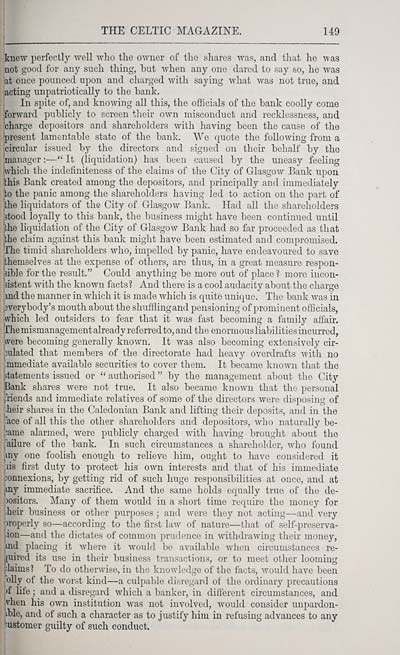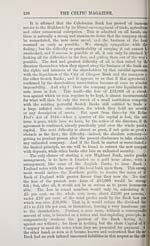Blair Collection > Celtic magazine > Volume 4
(159)
Download files
Complete book:
Individual page:
Thumbnail gallery: Grid view | List view

THE CELTIC MAGAZINE. 149
iknew perfectly avcU wlio the owner of the shares was, and tliat he was
not good for any such thing, but when any one dared to say so, he Avas
lat once pounced upon and charged with saying what was not true, and
rting unpatriotically to the bank.
In spite of, and knowing all this, the officials of the bank coolly come
[torward publicly to screen their own misconduct and recldessness, and
(charge depositors and shareholders with having been the cause of the
present lamentable state of the bank. We quote the following from a
circular issued by the directors and signed on their behalf by the
manager : — " It (lic[uidation) has been caused by the uneasy feeling
Which the indefiniteness of the claims of the City of Glasgow Bank upon
this Bank created among the depositors, and principally and immediately
to the panic among the shareholders having led to action on the part of
-the liquidators of the City of Glasgow Bank. Had all the shareholders
;3tood loyally to this bank, the business might have been continued until
the liquidation of the City of Glasgow Bank had so far proceeded as that
the claim against this bank might have been estimated and compromised.
Ihe timid shareholders who, impelled by panic, have endeavoured to save
themselves at the expense of others, are thus, in a great measure respon-
'sible for the result." Could anything be more out of place ? more incon-
sistent with the known facts? And there is a cool audacity about the charge
md the manner in which it is made Avhich is quite unic[ue. The bank was in
[everybody's mouth about the shuffling and pensioning of prominent officials,
which led outsiders to fear that it was fast becoming a family affair.
The mismanagement already referred to, and the enormous liabilities incurred,
were becoming generally known. It was also becoming extensively cir-
nilated that members of the directorate had heavy overdrafts with no
.mmediate available securities to cover them. It became known that the
:5tatements issued or " authorised " by the management about the City
[Bank shares were not true. It also became known that the personal
|.Tiends and immediate relatives of some of the directors were disposing of
'heir shares in the Caledonian Bank and lifting their deposits, and in the
:'ace of all this the other shareholders and depositors, who naturally be-
came alarmed, were publicly charged with having brought about the
[Mure of the bank. In such circumstances a shareholder, who found
[my one foolish enough to relieve him, ought to have considered it
.lis first duty to protect his own interests and that of his immediate
jionnexions, by getting rid of such huge responsibilities at once, and at
jmy immediate sacrifice. And the same holds equally true of the de-
positors. Many of them would in a short time require the money for
bheu' business or other purposes ; and were they not acthig — and very
broperly so — according to the first law of nature — that of self-preserva-
\ioTL — and the dictates of common prudence in withdrawing their money,
|ind placing it where it would be available when circumstances re-
^luired its use in their business transactions, or to meet other looming
[jlaims? To do otherwise, in the knowledge of the facts, would have been
[oUy of the worst kind — a culpable disregard of the ordinary precautions
()f life ; and a disregard which a banker, in different circumstances, and
ivhen his own institution was not involved, would consider unpardon-
tble, and of such a character as to justify him in refusing advances to any
{justomer guilty of such conduct.
iknew perfectly avcU wlio the owner of the shares was, and tliat he was
not good for any such thing, but when any one dared to say so, he Avas
lat once pounced upon and charged with saying what was not true, and
rting unpatriotically to the bank.
In spite of, and knowing all this, the officials of the bank coolly come
[torward publicly to screen their own misconduct and recldessness, and
(charge depositors and shareholders with having been the cause of the
present lamentable state of the bank. We quote the following from a
circular issued by the directors and signed on their behalf by the
manager : — " It (lic[uidation) has been caused by the uneasy feeling
Which the indefiniteness of the claims of the City of Glasgow Bank upon
this Bank created among the depositors, and principally and immediately
to the panic among the shareholders having led to action on the part of
-the liquidators of the City of Glasgow Bank. Had all the shareholders
;3tood loyally to this bank, the business might have been continued until
the liquidation of the City of Glasgow Bank had so far proceeded as that
the claim against this bank might have been estimated and compromised.
Ihe timid shareholders who, impelled by panic, have endeavoured to save
themselves at the expense of others, are thus, in a great measure respon-
'sible for the result." Could anything be more out of place ? more incon-
sistent with the known facts? And there is a cool audacity about the charge
md the manner in which it is made Avhich is quite unic[ue. The bank was in
[everybody's mouth about the shuffling and pensioning of prominent officials,
which led outsiders to fear that it was fast becoming a family affair.
The mismanagement already referred to, and the enormous liabilities incurred,
were becoming generally known. It was also becoming extensively cir-
nilated that members of the directorate had heavy overdrafts with no
.mmediate available securities to cover them. It became known that the
:5tatements issued or " authorised " by the management about the City
[Bank shares were not true. It also became known that the personal
|.Tiends and immediate relatives of some of the directors were disposing of
'heir shares in the Caledonian Bank and lifting their deposits, and in the
:'ace of all this the other shareholders and depositors, who naturally be-
came alarmed, were publicly charged with having brought about the
[Mure of the bank. In such circumstances a shareholder, who found
[my one foolish enough to relieve him, ought to have considered it
.lis first duty to protect his own interests and that of his immediate
jionnexions, by getting rid of such huge responsibilities at once, and at
jmy immediate sacrifice. And the same holds equally true of the de-
positors. Many of them would in a short time require the money for
bheu' business or other purposes ; and were they not acthig — and very
broperly so — according to the first law of nature — that of self-preserva-
\ioTL — and the dictates of common prudence in withdrawing their money,
|ind placing it where it would be available when circumstances re-
^luired its use in their business transactions, or to meet other looming
[jlaims? To do otherwise, in the knowledge of the facts, would have been
[oUy of the worst kind — a culpable disregard of the ordinary precautions
()f life ; and a disregard which a banker, in different circumstances, and
ivhen his own institution was not involved, would consider unpardon-
tble, and of such a character as to justify him in refusing advances to any
{justomer guilty of such conduct.
Set display mode to: Large image | Transcription
Images and transcriptions on this page, including medium image downloads, may be used under the Creative Commons Attribution 4.0 International Licence unless otherwise stated. ![]()
| Early Gaelic Book Collections > Blair Collection > Celtic magazine > Volume 4 > (159) |
|---|
| Permanent URL | https://digital.nls.uk/76554164 |
|---|
| Description | Volume IV, 1879. |
|---|---|
| Shelfmark | Blair.5 |
| Attribution and copyright: |
|
| Description | A selection of books from a collection of more than 500 titles, mostly on religious and literary topics. Also includes some material dealing with other Celtic languages and societies. Collection created towards the end of the 19th century by Lady Evelyn Stewart Murray. |
|---|
| Description | Selected items from five 'Special and Named Printed Collections'. Includes books in Gaelic and other Celtic languages, works about the Gaels, their languages, literature, culture and history. |
|---|

